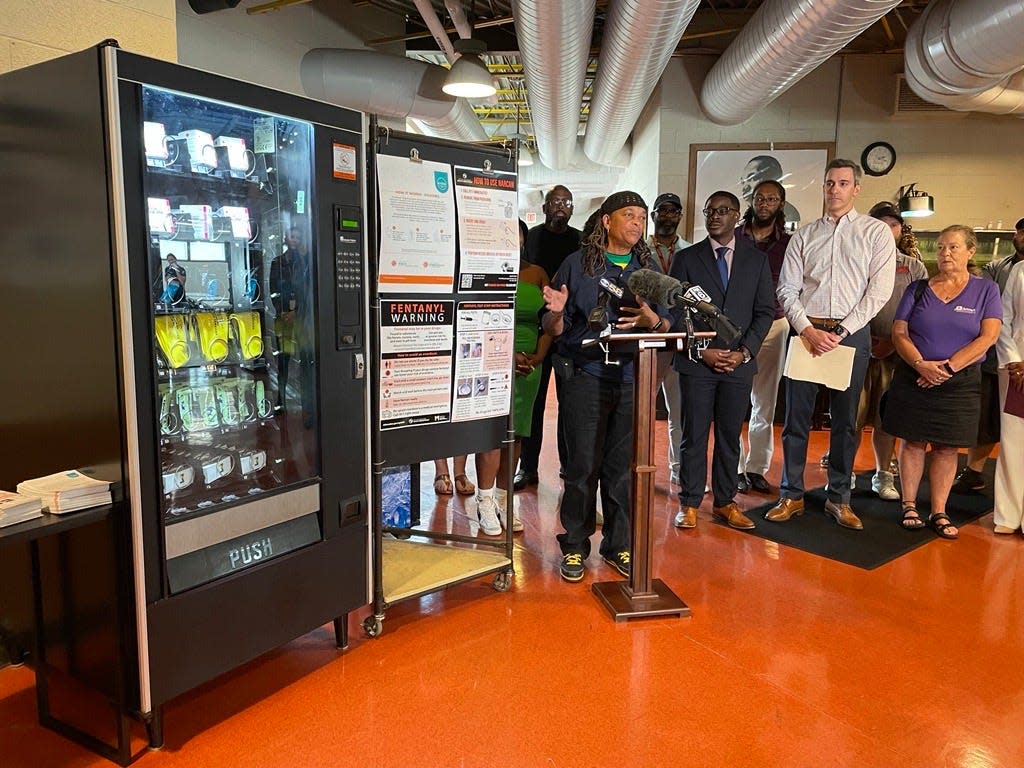Milwaukee County installs 11 free Narcan, Fentanyl test strips vending machines

Milwaukee County Executive David Crowley said his administration is making good on a promise to combat the county's opioid epidemic by installing 11 new vending machines countywide.
"By making items like Fentanyl testing strips of naloxone, nasal spray and other critical harm reduction supplies free and available without stigma, we can drive down the injury and harm from opioid overdoses throughout our community," he said Tuesday at Dr. Martin Luther King Jr. Community Center. "This is equity in action."
In the three weeks since their installation, the vending machines have distributed 760 kits of Narcan, 2,300 Fentanyl test strips, 1,000 medication lock bags, 1,200 medication re-activation bags, and 750 gun locks, according to Department of Health and Human Services officials.
In 2022, there were 667 fatal drug overdoses — with 559 involving opioids — in Milwaukee County, according to officials. No data has been released yet for 2023.
"Opioid use continues at crisis levels in Milwaukee County with opioid related deaths every 16 hours in 2022," said Milwaukee County's chief health policy adviser, Dr. Ben Weston. "Downstream efforts are critical in the moment that we're in."
Lauding the installation of the new vending machines, Weston said: "By having these vending machines, we reduce barriers to these essential tools."
Earlier this year, Crowley announced the installation of the first harm-reduction vending machine at the Marcia P. Coggs Human Services Center. That vending machine has since been relocated to the Dr. Martin Luther King Community Center Jr. at 1531 W. Vliet St. due to a greater amount of foot traffic.
Funded by part of the $11 million in opioid settlement funds allocated by the Milwaukee County Board, the county launched an application process in April for additional organizations across the county's 19 municipalities interested in being a part of the project.
There is no limit to how many supplies individuals can take from the machines. Information about the harm-reduction items in the vending machine is provided in both English and Spanish.
An additional 14 vending machines will be installed throughout the county in 2024.
Milwaukee County was also awarded $71 million from a $420 million settlement to Wisconsin after a multistate lawsuit against major opioids distributors, including Johnson & Johnson, for their role in a national health crisis. The settlements will be paid over the next two decades.
Department of Health and Human Services Director Shakita LaGrant-McLain emphasized her agency's continued investment in evidence-based practices and its push to expand community collaboration through medication-assisted treatment as well as other substance treatment related programs.
"The more we collectively work to reduce harm, the more we can save lives and together create healthier communities," she said.
Dee McCollum, who is the director of the Dr. Martin Luther King Jr. Community Center in the King Park neighborhood on Milwaukee's near west side, said she is used to helping serve individuals who are homeless, dealing with mental health issues as well as substance abuse.
For her, the vending machine is a blessing.
"Having this machine in here for our members that come in and no questions asked they can get what they need, let's me believe that if we save but one life, we have been successful in our journey," McCollum said.
One opioid related death every 16 hours
Early last year, Milwaukee County launched an online dashboard to track overdoses, which includes information about location and time of when fatal and nonfatal overdoses are occurring, as well as demographic information about the individuals.
In 2021, the county reported 644 drug overdose deaths, a nearly 54% increase in just two years. Of those people who died, 323 were white and 231 Black, with roughly 77% of the overdoses occurring at home. Last year there were a reported 667 overdose deaths, with eight potential cases pending, according to Weston.
Fatal overdoses for 2023 have not been updated on the dashboard.
While the numbers are still being tracked for 2023 and finalized for 2022, there were 1,315 suspected nonfatal overdoses in 2023 and 5,585 in 2022 in Milwaukee County, according to county data.
Earlier this year, the county announced that its hardest-hit ZIP codes included 53204 and 53215, which included the near south side neighborhoods of Walker's Point, Clarke Square, Historic Mitchell Street, Burnham Park, Lincoln Village and Polonia, according to Weston. The average age of those dying was 44.
Where can you access harm reduction vending machines?
Wisconsin Community Services, 2600 W. North Ave.
Greendale Safety Center, 5911 W. Grange Ave.
Outreach Community Health Centers, 210 W. Capitol Drive
Oak Creek Fire Department, 7000 S. Sixth St.
Community Advocates, 728 N. Lovell St.
Diverse & Resilient, 2439 N. Holton St.
Hillview Building, 1615 S. 22nd St.
Milwaukee County Community Reintegration Center, 8885 S. 68th St.
First Step, 2835 N. 32nd St.
AMRI Counseling Services, 4001 W. Capitol Drive
Dr. Martin L. King Community Center,1531 West Vliet St.
Contact Vanessa Swales at 414-308-5881 or vswales@gannett.com. Follow her on Twitter @Vanessa_Swales.
This article originally appeared on Milwaukee Journal Sentinel: Milwaukee installs 11 Narcan, Fentanyl test strips vending machines

